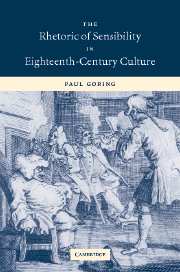Book contents
- Frontmatter
- Contents
- Preface
- Introduction
- 1 Spectacular passions: eighteenth-century oratory and the reform of eloquence
- 2 Bodies on the borders of politeness: ‘Orator Henley’, Methodist enthusiasm, and polite literature
- 3 Thomas Sheridan: forging the British body
- 4 The art of acting: mid-century stagecraft and the broadcast of feeling
- 5 Polite reading: sentimental fiction and the performance of response
- Epilogue
- Bibliography
- Index
1 - Spectacular passions: eighteenth-century oratory and the reform of eloquence
Published online by Cambridge University Press: 22 September 2009
- Frontmatter
- Contents
- Preface
- Introduction
- 1 Spectacular passions: eighteenth-century oratory and the reform of eloquence
- 2 Bodies on the borders of politeness: ‘Orator Henley’, Methodist enthusiasm, and polite literature
- 3 Thomas Sheridan: forging the British body
- 4 The art of acting: mid-century stagecraft and the broadcast of feeling
- 5 Polite reading: sentimental fiction and the performance of response
- Epilogue
- Bibliography
- Index
Summary
To shake the armes with a kinde of perpetuall motion, as if they would straightway flie out of the sight of their Auditours, or were about to leave the Earth: is a Prævarication in Rhetorique. Such Oratours have been compared to Ostriches.
John Bulwer (1644)Grief, sudden and violent, expresses itself by beating the head; groveling on the ground; tearing of garments, hair, and flesh; screaming aloud, weeping, stamping with the feet, lifting the eyes, from time to time, to heaven; hurrying to and fro, running distracted, or fainting away, sometimes without recovery.
James Burgh (1761)PUBLIC SPEAKING AND THE ‘ELOCUTIONARY MOVEMENT’ IN EIGHTEENTH-CENTURY BRITAIN
The bodily production and broadcast of words were serious issues in eighteenth-century Britain. Public address, in its various forms in churches, courtrooms, political assemblies, theatres, and schools, remained, despite a burgeoning print culture and increasing levels of literacy, a dominant medium for popular communication. ‘It is by speech’, Thomas Sheridan wrote in 1780, ‘that all affairs relative to the nation at large, or particular societies, are carried on.’ And he elaborated to convey the range of institutions whose everyday business depended upon effective public speech: ‘In the conduct of all affairs ecclesiastical and civil, in church, in parliament, courts of justice, county courts, grand and petty juries, vestries in parishes, are the powers of speech essentially requisite.’
- Type
- Chapter
- Information
- Publisher: Cambridge University PressPrint publication year: 2004

